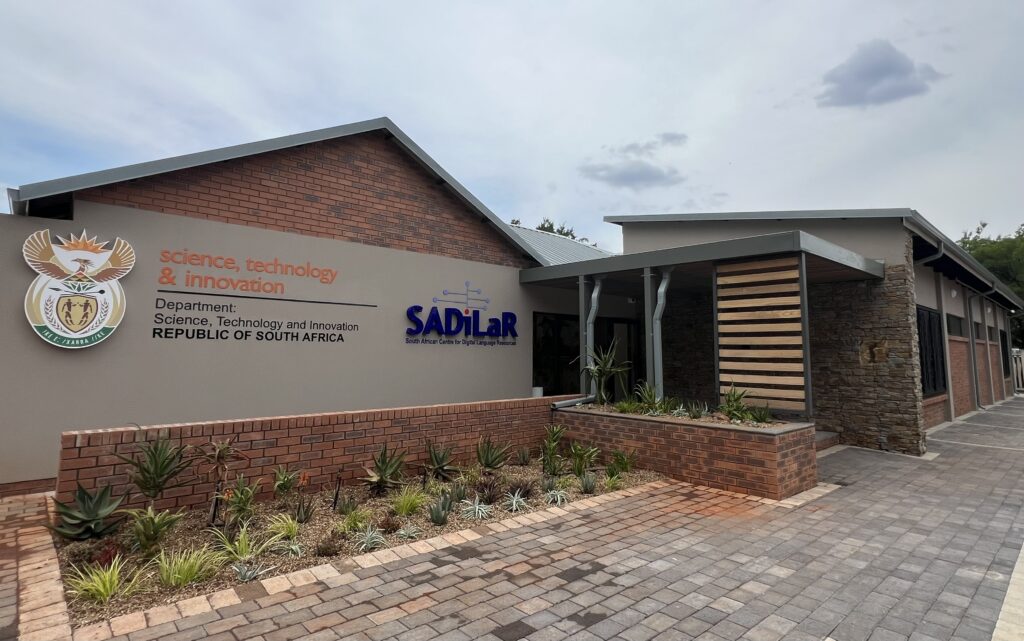20 November 2024

The South African Centre for Digital Language Resources (SADiLaR) will be celebrating the official opening of its building at the North-West University’s Potchefstroom campus on Friday, 22 November 2024. The event will also see the launch of SADiLaR’s 5-Year (2024-2029) Strategic Plan and a special book publication of the Centre’s eight-year history.
Invitees to this momentous occasion include SADiLaR’s parent ministry and funder, the Department of Science, Technology and Innovation (DSTI), the Department of Higher Education and Training (DHET), the Department of Sports, Arts and Culture (DSAC), Universities South Africa (USAf), SADiLaR’s steering committee, the founding director of SADiLaR, Prof Justus C Roux and his immediate successor, Prof Attie de Lange, and other key stakeholders.
“SADiLaR plays a pivotal role in the advancement and preservation of South Africa’s under-resourced indigenous languages, which often lack digital representation and scholarship. By enabling language-related research and localised technology development for these languages, we create a digital footprint, which is crucial for the survival of any language in the 21st century. Ensuring a digital future for all official languages in South Africa is SADiLaR’s key objective,” says SADiLaR’s current executive director, Prof Langa Khumalo.
“We aim to achieve this by creating and managing digital language resources and applicable software through our digitisation programme. We also stimulate and support computational research and development in the humanities and social sciences through our digital humanities programme, and contribute as an enabler of strategic activities related to language policy planning, development and support in the South African context, especially the implementation of the new Language Policy Framework for Public Higher Education Institutions,” he continues.
Concrete expression of commitment to support SADiLaR’s mission
Officiated by the DSTI and the DHET, the opening event will be led by the Vice-Chancellor and Principal of the NWU, Prof Bismark Tyobeka; the Deputy Vice-Chancellor of Research and Innovation, Prof Jeffrey Mphahlele; and other senior management officials.
“The SADiLaR building, constructed by the NWU and situated at its Potchefstroom campus, is a concrete expression (pun intended) of the NWU’s commitment to support the mandate and mission of SADiLaR,” Khumalo comments. “It is a symbolic and real expression of the strategic importance of the role that this research infrastructure plays and will continue to play in the foreseeable future in growing the national science and providing a digital future to all the official languages of South Africa. SADiLaR provides infrastructure and longevity for research, just like this building provides a permanent home for us.”
According to Khumalo, the expansion of SADiLaR’s mandate to influence national policy and embrace the affordances of artificial intelligence systems is testament to its responsiveness to the imperatives of both Higher Education and that of Industry 4.0 and Industry 5.0.
“This growing expansion and influence is articulated in the 5-Year Strategic Plan that we are launching, whereas the book about SADiLaR’s brief history serves as a permanent reminder and source of inspiration of where it has come from.”
SADiLaR’s 5-Year (2024-2029) Strategic Plan will be launched by Prof Mogomme Masoga, the Chair of SADiLaR’s steering committee. There will also be an official unveiling of portraits in the new boardroom (known as The Innovation Hub) of SADiLaR’s founding director and immediate successor, Prof Justus C Roux and Prof Attie de Lange.
About SADiLaR
SADiLaR is a national centre supported and established by the Department of Science, Technology and Innovation in 2016 as one of thirteen national research infrastructures within the broad South African Research Infrastructure Roadmap (SARIR). After a two-year incubation period, it was formally launched as a research infrastructure in August 2019, with the North-West University (NWU) functioning as host and hub of a network of linked research nodes based at different universities and institutions.
The centre has an enabling function, with a focus on all official languages of South Africa, supporting research and development in the domains of language technologies and language-related studies in the humanities and social sciences. It supports the creation, management and distribution of digital language resources, as well as applicable software, which are freely available for research purposes.
SADiLaR stakeholders include academic scholars and professionals in all domains of humanities and social sciences, language technologies, natural language processing, computer science, as well as potential end-users in education, business and industry.
Media enquiries to be directed to:
Miss Lihle Sosibo
Communication Manager: SADiLaR
Mobile: 0646849281
